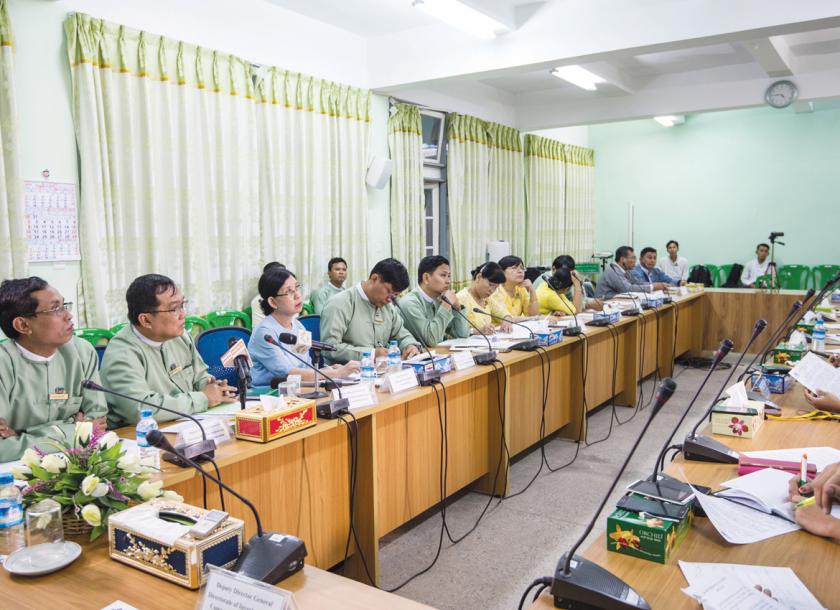Myanmar: 15 days for regional investment commissions to assess applications
Regional and state investment commissions are given 15 working days to review an application once they have accepted a submission from an investor, according to Notification No 25/2017 released by the Myanmar Investment Commission.
The Myanmar Investment Commission (MIC) has released the latest procedures for state and regional investment commissions in assessing various types of applications.
The new Investment Law enacted and promulgated earlier this year has delegated power to regional authorities.
Regional and state investment commissions have the authority to approve investment proposals without having to seek permission from the MIC. Exceptions include capital intensive investments, investments with considerable environmental impacts and sectors asked by the Union government for scrutiny will need to ask the MIC for approval.
The maximum amount of investments which can be approved by regional and state investment commissions is US$5 million (K6 billion).
Approving an investment proposal
According to the notification, applicants have 20 working days (or a longer duration in the case of an extension) to respond to a request for additional information from the regional or state investment commissions. Otherwise, the application / proposal will be rejected.
Regional and state investment commissions have at most 15 working days to decide whether to reject an application upon receiving the application.
Within the 15 days, the investment commissions can liaise and discuss with government departments and other organisations to assess the proposal.
If the application is not rejected within that designated duration, it will be marked as approved.
Applications for Land Rights Authorisation
Sub-national investment commissions can assess and accept those Land Rights Authorisation applications which fall under $5 million, the maximum amount those investment commissions can approve without the MIC’s intervention.
Similar to the general application procedure, the commissions are required to contact and talk to related departments and organisations.
When reviewing Land Rights Authorisation applications, the commissions are mandated to examine the essential information, including the location, type, and area of the land or building, information about the landlords and owners and the period of the Land Rights Authorisation proposed.
The commissions are also mandated to assess whether the area proposed by the application will need to undertake any significant alteration of topography or elevation of the land.
Other documents and details needed to be submitted by an applicant include the draft of an agreement contract for leasing out the land or building, proof of land/ building ownership as well as an approval from the relevant regional/ state government departments or bodies for the change in land use necessitated by the investment project.
Tax incentives
The regional and state investment commissions do not have the power to approve tax incentive application. Only the MIC is mandated to make decisions on those applications.
The notification noted that any proposed investment business applying for income tax incentive must fulfil the requirements in terms of its geographical location, the type of investment zone and whether the business is within sectors prioritised and promoted by the government.
Additionally, tax incentive applicants must have at least 80 percent of business’ revenues expected to come from exports, as well as in foreign currency.
Those who apply for tax incentives must also have the information on the ratio of their investment revenue coming from exports, as well as in foreign currency.
The regional commissions are required to review whether the applications have the necessary information before sending them to the MIC.
Additionally, regional and state investment commissions are required to submit a report every three months to the MIC with information about the newly approved investments. The report must also include the development of the flow of investment in the corresponding state or region.
The investment commissions are also empowered to exclude investors who have abused human rights in any jurisdiction, according to the International Commission of Jurists (ICJ).
In May, Dr Daniel Aguirre, a legal adviser with the ICJ in Myanmar, told The Myanmar Times that both the government and civil society should ensure that the investment commissions use their mandate to tackle irresponsible investment through public consultation, legal framework and other means.
“The Investment Rules of 2017 instruct the MIC to consider whether investors have demonstrated a commitment to responsible investment. In considering the good character and reputation of the investor, the MIC may study whether the investor or any associate with an interest in the investment broke the law in Myanmar or any other jurisdiction,” Dr Aguiree said, adding that the rules explicitly mention environmental, labour, tax, anti-bribery and corruption and human rights law.
“What this means is that if an investor is shown to have committed a crime, has violated environmental protection standards or was involved with human rights abuses, the MIC should not grant it a permit to invest here.
“If such a company applies for an investment permit, civil society should bring its record to the attention of the MIC and advocate for the rejection of a permit. The MIC should also conduct its own research into applicants,” he explained.
Chapter two of the new Investment Law states that the objective of the new law is to “develop responsible investment businesses which do not cause harm to the natural environment and the social environment for the interest of the Union and its citizens.”
64(d) of the investment rules explicitly instructs that MIC has the authority to reject investment proposals if the investor has not demonstrated a commitment to “environmental conservation actions, compliance with
environmental conservation policies, human rights and application of effective technology for natural resources and practices of waste management.”
According to Dr Aguirre, civil society should pro-actively submit information about applicant investors to the investment commissions for consideration.
Source: https://www.mmtimes.com/news/15-days-regional-investment-commissions-assess-applications.html


 Thailand
Thailand




